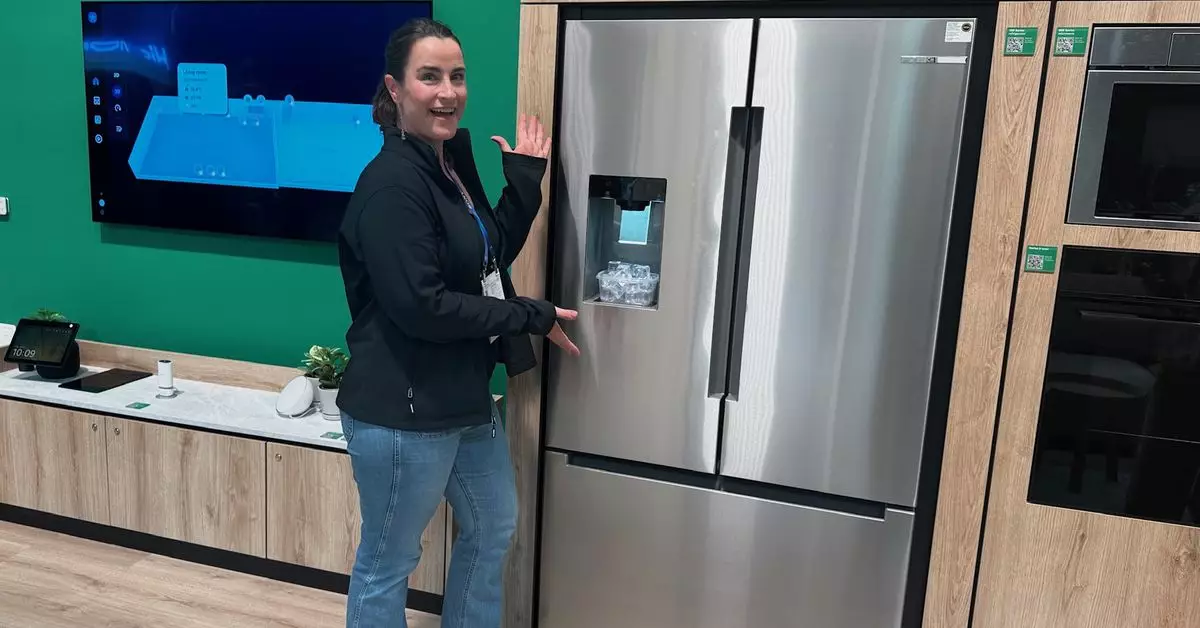The integration of smart technology into our everyday appliances has transformed the way we interact with these devices, offering novel solutions to familiar tasks. Among the crop of manufacturers championing this change, Bosch stands out with its recent unveiling of the 100 Series French Door Bottom Mount Refrigerator at CES. This innovative appliance, set to hit the U.S. market this coming spring, is the company’s first product equipped with Matter technology – a significant stride towards a more interconnected home environment.
The 100 Series refrigerator, which carries a $2,500 price tag, is more than just a conventional cooling appliance. Thanks to its built-in chip that supports Matter, the refrigerator promises to leverage local communication to enhance its connectivity features. With Matter, users can anticipate a more secure and responsive way to manage their appliances, eliminating the reliance on cloud services that can often lead to latency issues or privacy concerns.
Beyond mere connectivity, Matter technology heralds a new era for smart appliances. Consumers can manage not just refrigeration temperatures but receive timely alerts on food conditions and can even receive notifications if the fridge door is left ajar. This responsiveness is particularly appealing as it highlights a shift towards more interactive and user-friendly home management systems that keep pace with the demands of busy households.
As Bosch and its parent company, BSH, gear up for the broader implementation of Matter across its product lines, the 100 Series acts as a key step in this direction. Eelco Lammertink from BSH has stated the plan is to extend Matter support to various appliances, with refrigerators gaining this functionality this year followed by other appliance categories in the coming years. This gradual expansion indicates BSH’s commitment not only to consumer convenience but also to developing a cohesive ecosystem within the smart home domain.
However, while the 100 Series refrigerator marks a significant innovation, it is important to note that existing appliances will not receive Matter updates. This decision could leave some consumers disappointed, particularly those who own high-end Bosch or Thermador appliances. The technical complexities of retrofitting Matter support into existing devices pose significant risks, and Lammertink emphasizes that the priority is to avoid “bricking” functional appliances. Hence, consumers may find themselves having to purchase new appliances to enjoy the benefits of an interconnected home system fully.
Matter, designed by an alliance of tech giants including Apple, Amazon, Google, and Samsung, aims to standardize communications across smart devices in a user’s home. By utilizing local networks like Wi-Fi and low-power Ethernet, Matter provides a secure platform for smart home devices to interact without burdensome cloud dependencies. This local connectivity fosters not only speed but also safeguards user data—an increasing concern in today’s digital landscape.
Currently, Matter’s compatibility spans various smart home brands and product types, reinforcing its role as a versatile backbone for smart interoperability. For instance, a Matter-capable refrigerator could communicate effectively with smart lighting, heating systems, security cameras, and other devices within the same network. Such an integrated approach not only enhances convenience but also paves the way for advanced functionalities like energy management systems, where appliances can work in concert to optimize energy consumption seamlessly.
With significant players in the smart home market backing the Matter initiative, the future looks promising for tech-savvy homeowners seeking comprehensive control over their environments. In particular, the introduction of the Bosch 100 Series refrigerator is a clear indication of how manufacturers are responding to market demands for not only innovation but also security and usability in smart technology.
The advent of the Matter-enabled Bosch refrigerator represents a pivotal moment in the evolution of smart appliances. As integration becomes a norm rather than an exception, consumers can look forward to a more coherent and efficient experience, melding convenience, security, and control into one robust system. The promise of a truly smart home—where appliances communicate effectively, enhance daily living, and contribute to energy efficiency—is finally taking shape, one appliance at a time.

